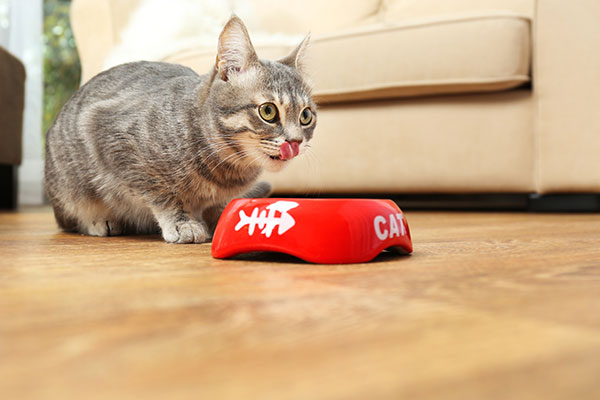Cats may have lived with humans for thousands of years since we domesticated them. But these animals are yet to shed most of their evolutionary traits, such as their feeding habits.
In the wild, cats are known to hunt down and consume their prey raw – flesh, bones, skin, hair, feathers, hooves, talons, entrails, and all.
Indeed, it’s almost impossible to hear of accounts where a wild cat choked on his food. Therefore, it’s natural for cat owners to assume that chicken bones are completely safe for their feline friends. But how true are these assumptions, and can cats eat chicken bones?
The short answer is yes, cats can eat chicken bones. In fact, chicken bones come with a cocktail of essential minerals that your cat might benefit from.
So, are chicken bones safe for cats?
Although we’ve just highlighted that cats can consume chicken bones, the answer isn’t as cut and dried as it may sound. As you shall find, chicken bone is safer for cats if served raw. But even raw chicken bones might carry some inherent risks for your feline friend.
Read on as we uncover some of the benefits and potential risks of chicken bones for cats.
Table of Contents
What Are Some Of The Benefits Of Chicken Bones For Cats?
To understand the potential benefits of chicken bones for cats, we should begin easy by analyzing a cat’s evolutionary feeding habits.
As you might already know, cats are considered obligate carnivores (or true carnivores). Which implies that your cat can thrive exclusively on the nutrients obtained from animals. And since bones typically come from animals, it’s logical to deduce that evolution prepared cats for chicken bones. In simpler terms, a cat’s body is naturally designed to crush, chew, and digest chicken bones.
So, you may have wondered to yourself, can cats digest bones? Yes. Not only are a cat’s teeth able to chew bones, but the animal’s body is also designed to digest bones. Of course, not as effectively as it digests flesh.
Another potential benefit of chicken bones for cats is that the bones contain numerous medically and nutritionally beneficial minerals, including calcium, magnesium, potassium, and phosphorus.
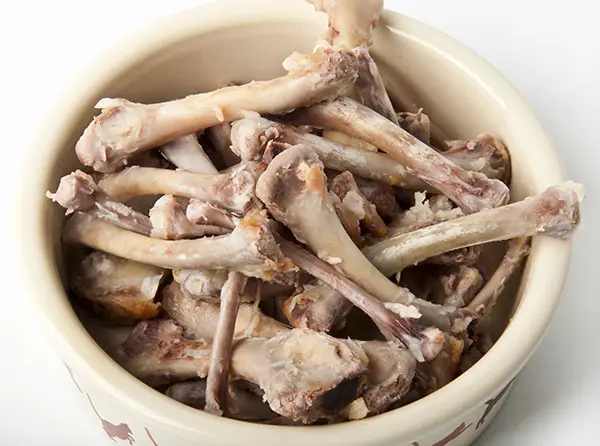
Calcium is necessary for building and maintaining strong bones and teeth. A high supply of calcium can help to prevent oral diseases like bleeding gums and plaque. The mineral is also required in maintaining the functions of organs like the heart, nerves, and muscles.
Studies have even cited calcium for its ability to guard against chronic conditions like feline diabetes, cancer, and high blood pressure.
What’s more, calcium can increase the rate of absorption of other essential minerals and vitamins, such as copper, zinc, and Vitamins A, D, and E.
Magnesium is another essential mineral found in chicken bones, which may protect your cat from chronic conditions like diabetes.
Magnesium can also help to fight feline depression and anxiety disorders, such as separation anxiety. Other potential benefits of magnesium for cats include regulation of blood pressure and prevention of inflammatory conditions like feline arthritis and cancer.
Potassium works side by side with sodium to regulate fluid balance. The high-potassium content in chicken bones might also help in relieving muscle spasms and enhancing nerve signals. Plus, potassium is believed to protect against high blood pressure, water retention, osteoporosis, and kidney stones.

Phosphorus, which also happens to be abundant in chicken bones, is best known for its ability to promote strong teeth as well as reduce muscle pain and spasticity. Phosphorus also plays a role in eliminating toxins from the kidneys, maintaining and repairing damaged tissues and cells, and forming the building blocks of DNA and RNA.
Another notable benefit of offering chicken bones to cats is that it provides them with mental stimulation. By chewing chicken bones, the cat will be able to satisfy his chewing instincts while also keeping himself engaged. That explains why many cat owners prefer to offer chicken bones to their feline friends as a way of treating or distracting them.
Last but not least, chicken bones (or bones in general) can strengthen your cat’s teeth and enamel. This doesn’t necessarily have to do with the minerals in bones that are known to promote healthy teeth. Instead, the mere act of chewing hard foods from time to time has long-term benefits for a cat’s teeth. By eating chicken bones over time, your cat’s teeth will get accustomed to chewing even harder bones.
- Rice and oat meal are easily digestible and gentle on the digestive system
- High protein formula, with real lamb as the first ingredient
- Fortified with guaranteed live probiotics for digestive and immune health
Last update on 2024-07-08 / Affiliate links / Images from Amazon Product Advertising API
So, can domestic cats eat chicken bones?
Yes, domestic cats can eat chicken bones. In fact, there are several ways a domestic cat can benefit from chicken bones.
But the question remains, is it safe for cats to eat chicken bones? The following section shall expound further on that.
What Are The Potential Risks Of Chicken Bones For Cats?
Although chicken bones come with tons of potential health benefits for cats, there are equally side effects to watch out for.
First up, note that the risks of chicken bones for cats depends on whether you offer the bones to your feline friend raw or cooked. And that brings us to the question, can cats eat raw chicken bones? What of cooked chicken bones, can cats eat cooked chicken bones?
The answer is ‘yes’ to both questions. However, experts recommend feeding cats raw as opposed to cooked chicken bones, and there are several reasons why.
The following are some of the risks of feeding cooked chicken bones to cats;
1. Splintering
Cooking makes chicken bones softer, which is a great thing. However, cooking also makes the bones brittle, hence prone to splintering.
Splintering bones can cause cuts and lacerations in your cat’s gums during chewing. Worse yet, the bones could tear through the animal’s digestive tract, resulting in excruciating pain and internal bleeding.
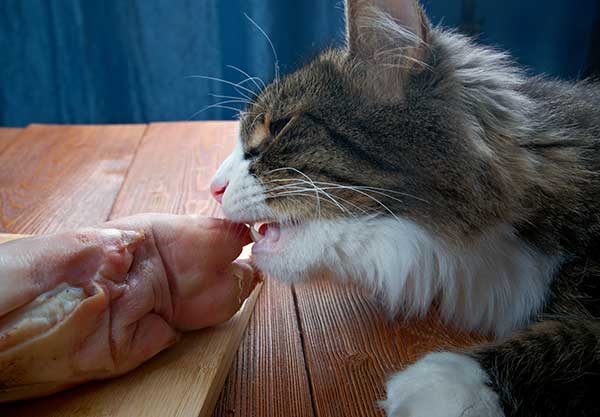
2. Obstruction
Cooked chicken bones also tend to be less flexible than raw bones. As such, they present higher risks of choking.
Due to their inflexibility, cooked chicken bones might also cause obstruction in your cat’s digestive system.
Now, you could be wondering, can cats digest cooked chicken bones?
While cats can generally digest cooked chicken bones, the fact that cooked bones are fairly inflexible makes them a bit difficult to digest compared to raw bones.
ALSO READ: Can Cats Eat Salmon? Health Benefits and Potential Side Effects
3. Toxic ingredients
The process of cooking chicken bones might include the use of toxic ingredient, such as fats, salt, as well as spices like garlic and onions.
While these ingredients are generally safe for humans, cats have a low tolerance for them.
High-fat foods can trigger obesity and other lifestyle diseases like diabetes, hypertension, and heart disease. Fatty foods might also cause a laxative effect, leading to loose stools.
Excessive consumption of salt might lead to a condition known as sodium ion poisoning. Sodium ion poisoning is a life-threatening disease that manifests in a variety of symptoms, including;
- Gastrointestinal complications like vomiting and diarrhea
- Nausea and appetite loss
- Abdominal pain
- Frequent urination, followed by extreme thirst sensation
- Uncontrollable fluid build-up
- High fever
- Increased heart rate
- Persistent headaches
- Generalized fatigue
- Muscle spasticity
- Tongue swelling
- Drowsiness
- Seizures and convulsions
- Respiratory distress
- Poor motor coordination
Without urgent medical intervention, sodium ion poisoning might trigger a coma and result in the eventual death of your feline friend.
- EASY TO USE, IMPACTFUL RESULTS: Collect a sample, package it up, and send it securely back. Just register, swab, return with the...
- MOST COMPREHENSIVE BREED & TRAIT: Our test distinguishes over 20+ distinct breeds and 50+ trait markers with the most...
- SCREEN FOR 40+ GENETIC DISEASES: Get peace of mind by screening for 64 health markers associated with 43 diseases for which your...
Last update on 2024-07-08 / Affiliate links / Images from Amazon Product Advertising API
So, can chicken bones kill cats?
Now, you may have wondered to yourself time and again, ‘can cats die from eating chicken bones?’
While death may not come instantaneously, feeding cooked chicken bones to cats might trigger potentially life-threatening conditions, especially if the bones are cooked with too much salt and other toxic ingredients.
Spices like onions and garlic are nearly as hazardous for cats as salt is. Consumption of worrying levels of onions or garlic might trigger a condition called Heinz body anemia. The disease manifests in symptoms like lethargy, muscle coordination, red or brown discolored urine, vomiting and diarrhea, pale gums, and hyper-salivation.
In addition to the above risks of feeding cooked chicken to cats, it’s also important to note that cooking might destroy some of the minerals in the bones. So, that makes raw chicken bones the better option for cats.
However, it’s also worth noting that raw chicken bones aren’t entirely risk-free. The most common problem associated with raw chicken bones for cats is the risks of bacterial infection
Raw food offers an ideal breeding ground for bacteria, especially if the food isn’t properly treated or refrigerated. Salmonella is one of the most common bacteria that thrive in raw and poorly-preserved food, including chicken bones.
While a cat’s digestive juices might handle a bit of salmonella, exposure to worrying levels of this bacteria might cause salmonella poisoning, a condition that’s medically known as salmonellosis.
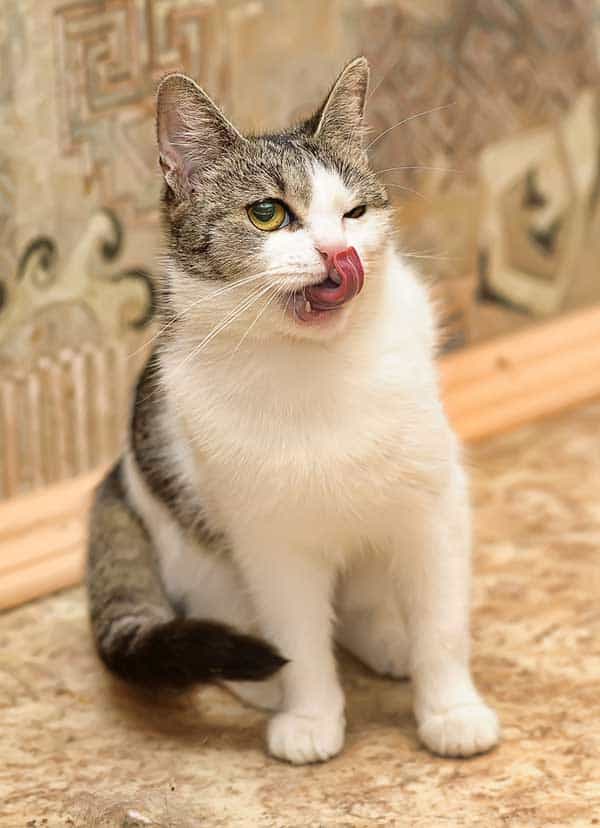
Some of the symptoms of salmonellosis include;
- Gastrointestinal issues like vomiting and diarrhea
- Nausea and appetite loss
- Abdominal pain
- Dehydration
- Rapid weight loss
- Mucus in feces
- Lethargy
- Elevated body temperature
- Depression
By and large, raw chicken bones appear to be more beneficial for cats than cooked chicken bones. However, remember that raw or cooked, chicken bones might still present serious risks to your feline friend, especially if you offer the bones to your cat unsupervised.
ALSO READ: Can Cats Eat Raw Chicken? Health Benefits and Potential Side Effects
What Happens If My Cat Ate A Chicken Bone?
It’s not unusual to come across a cat owner wondering, ‘my cat ate cooked chicken bone, what should I do?’
If you suspect that your cat ate chicken bones, the best place to begin is by establishing whether the bones were raw or cooked. As we’ve already highlighted, the risks are higher if your cat ate cooked chicken bones, and worse yet if the bones were not prepared properly.
For instance, if your cat ate fried chicken bone, you can expect symptoms like diarrhea. That’s because frying involves the use of fat, and fat can produce laxative effects.
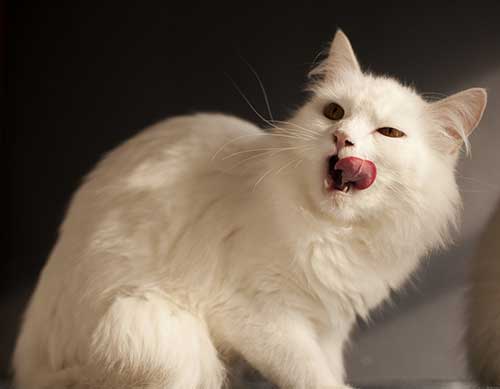
You could also be wondering, ‘my cat ate chicken bones and is throwing up, what should I do?’
As vomiting can lead to dehydration, it’s imperative that you supply your cat with enough fluids to keep him hydrated.
Most importantly, remember that these are just temporary remedial measures you prepare to take your cat for professional examination.
Even better, you can adopt certain proactive measures to ensure that your cat doesn’t develop complications from eating chicken bones in the first place.
For instance, you might consider grounding chicken bones to reduce the risks of splintering and choking.
But can cats eat ground chicken bones?
Yes, they can. Although most cats prefer their bones whole and not ground, grounding is the safer way to feed chicken bones to them.
Other measures you can take to prevent the risks associated with chicken bones for cats include;
- Feeding smaller bones like wings, necks, and wings.
- You should preferably go for raw bones and ensure that they’re fresh and properly washed.
- Insist on bones of farm-grown animals.
- Supervise the animal at all times.
- Replace the bones entirely with homemade bone broth.
- Real turkey is the number 1 ingredient in this Purina indoor cat food to help provide the protein she needs for strong muscles,...
- High protein cat food kibble with 10 percent less fat than Purina ONE Tender Selects Blend With Real Chicken helps her maintain a...
- A SmartBlend of fiber-rich nutrition in weight control dry cat food helps minimize hairballs, and four antioxidant sources support...
Last update on 2024-07-07 / Affiliate links / Images from Amazon Product Advertising API
Other commonly asked questions concerning cats and chicken bones include;
Can cats eat chicken wishbone?
Cats can eat any bone, provided that you cut it into smaller pieces.
Can feral cats eat chicken bones?
Yes. But you should tread with caution, considering that the cat may be consuming chicken bones for the first time.
Conclusion
Cats can eat chicken bones and there shouldn’t be any immediate health concerns to worry about. However, insist on raw chicken bones to lower the risks of splintering. Most importantly, go for fresh and properly-preserved bones to prevent the growth of harmful bacteria.
Checkout Our Favorite Cat Products
1. Best Online Course For Cat Parents
Our favorite: The Cat Language Bible (How to Finally Understand And Speak to Your Cat) – A new form of cat to human communication that many cat owners have dreamed about… but few have actually thought possible.
2. Best Vacuum to Tackle Pet Hair
Our favorite: ORFELD Cordless Vacuum – Engineered for homes with pets. With features and tools that dig out dirt, hair and allergens everywhere your pet gets.
3. Best Immune Support For Cats
Our favorite: Tomlyn Immune Support – Best Supplement for Cats and Kittens.

